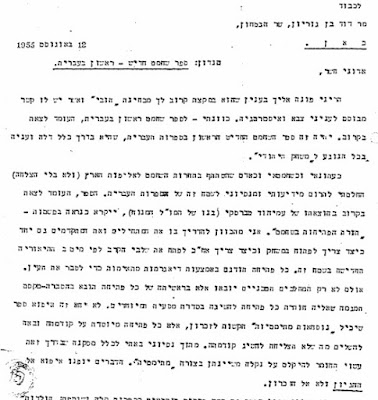A frequent correspondent notified us of a funny exchange between David Ben-Gurion and Shaul Hon found in Ben Gurion's archives. In 1955, Hon (letter above) asked Ben Gurion to write an introduction to his book, Chess Openings, describing it (technically inaccurately) as "the first chess book in Hebrew." Naturally Hon emphasizes the importance of chess as the "Jewish game," the importance of the book to Zionism under the "for the first time in 2000 years" principle, and flatters Ben Gurion by saying he (Ben Gurion) is known as a chess player.
Ben Gurion politely refused, noting that while he supports the publication of the book as a worthy goal and would be glad to read it, he is "unjustly suspected" by Hon of having any chess abilities or achievements.
Incidentally, Ben Gurion repeats the same refusal to write an introduction later, in 1966, this this time to a request by Eliahu Shahaf. Again, he supports the publication of the book and even adds that Gat, one of the best Israeli players and a member of his kibbutz, told him about it, but that he doesn't have the chess skills to write an introduction for a chess book.
The letter is of interest since Ben Gurion gives some details of chess career (or rather lack thereof), noting that he played as a youth (in Russia) but "was never good at the game." Once in Palestine, he hardly played at all, except for a short time in Sejera, against "Meir Rodberg who was a good player."




